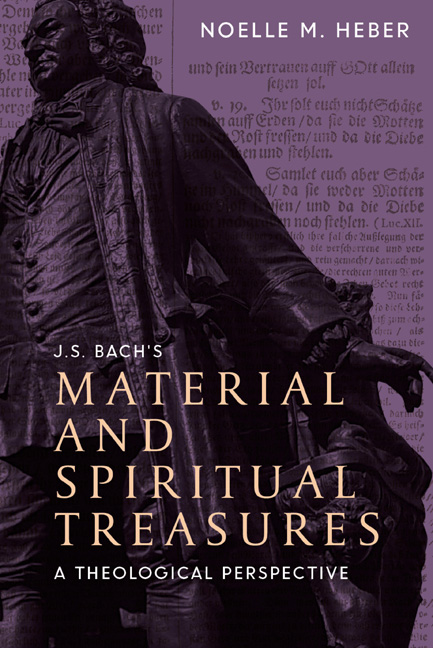Book contents
- Frontmatter
- Dedication
- Contents
- List of Illustrations
- List of Music Examples
- Foreword
- Preface
- List of Abbreviations
- Introduction
- 1 Bach’s Material Treasures: Career, Salary, and Freelancing
- 2 The Servant Prince: Poverty of Christ: Three Days of Christmas (BWV 91, 197a, 248/I, 121, 151)
- 3 Mammon’s Chain: The Destructive and Redemptive Potentials of Material Wealth: Ninth Sunday after Trinity (BWV 105, 94, 168)
- 4 The Afflicted Shall Eat: Tables Are Turned in Eternity: First Sunday after Trinity (BWV 75, 20, 39)
- 5 Spiritual Manna: The Lord Embraces the Poor: Seventh Sunday after Trinity (BWV 186, 187)
- 6 ‘Blood Money’: The Coins that Bought Jesus’ Death: Good Friday (St Matthew Passion)
- 7 Bach’s Spiritual Treasures: Values and Priorities
- Bibliography
- Index of Biblical References
- General Index
7 - Bach’s Spiritual Treasures: Values and Priorities
Published online by Cambridge University Press: 27 March 2021
- Frontmatter
- Dedication
- Contents
- List of Illustrations
- List of Music Examples
- Foreword
- Preface
- List of Abbreviations
- Introduction
- 1 Bach’s Material Treasures: Career, Salary, and Freelancing
- 2 The Servant Prince: Poverty of Christ: Three Days of Christmas (BWV 91, 197a, 248/I, 121, 151)
- 3 Mammon’s Chain: The Destructive and Redemptive Potentials of Material Wealth: Ninth Sunday after Trinity (BWV 105, 94, 168)
- 4 The Afflicted Shall Eat: Tables Are Turned in Eternity: First Sunday after Trinity (BWV 75, 20, 39)
- 5 Spiritual Manna: The Lord Embraces the Poor: Seventh Sunday after Trinity (BWV 186, 187)
- 6 ‘Blood Money’: The Coins that Bought Jesus’ Death: Good Friday (St Matthew Passion)
- 7 Bach’s Spiritual Treasures: Values and Priorities
- Bibliography
- Index of Biblical References
- General Index
Summary
THE survey of Johann Sebastian Bach's ‘material treasures’ in Chapter One shows that he pursued a career path that was increasingly lucrative, despite humble beginnings and no university education. Bach composed abundantly for the church and, in doing so, engaged with theological texts which, among other things, address biblical topics related to material and spiritual treasures. These concepts, which are present in Bach's church music and elaborated in the wider Lutheran theological context from the sixteenth to eighteenth centuries, consistently prioritise the ‘eternal’ over the ‘temporal’ and the ‘spiritual’ over the ‘material’. Table 7.1 recapitulates the consequential relationships that emerged in Chapters Two to Six.
The ideology communicated through these consequential relationships is that material wealth can lead to one's ruin and is best given away to those in need, while spiritual treasures often relate directly to the person of Jesus and the salvation that he grants to those who believe. Furthermore, whether one is poor or rich on earth is of little consequence; the poor on earth may still become rich in heaven while the rich on earth may in heaven become poor, depending entirely on whether or not they choose faith in Christ, which, according to Lutheran thought, is the only path to eternal salvation. Members of the Lutheran church were called to live out the practical implications of this theology in their own lives, and from this Bach himself would not have been exempt. These practices rely on the Christian belief that life on earth is a temporal and imperfect state and that the eternal state will be either one of perfection and unending joy for believers in heaven, or one of unending torment and pain for unbelievers in hell. Bach's expression of biblical concepts in his compositions, his engagement with theological writings, and his practical handling of money in his own life give some indication of how he personally confronted the tension between the temporal and the eternal; between the anticipation of an ultimate reality after death and the practical, everyday necessity of earning a living. This final chapter brings together the elements of this exploration through a consideration of some of the clues that Bach left concerning his ‘spiritual treasures’: his compositional choices, his markings in the Calov Bible Commentary, and the way he handled money during his lifetime.
- Type
- Chapter
- Information
- J. S. Bach's Material and Spiritual TreasuresA Theological Perspective, pp. 209 - 240Publisher: Boydell & BrewerPrint publication year: 2021



